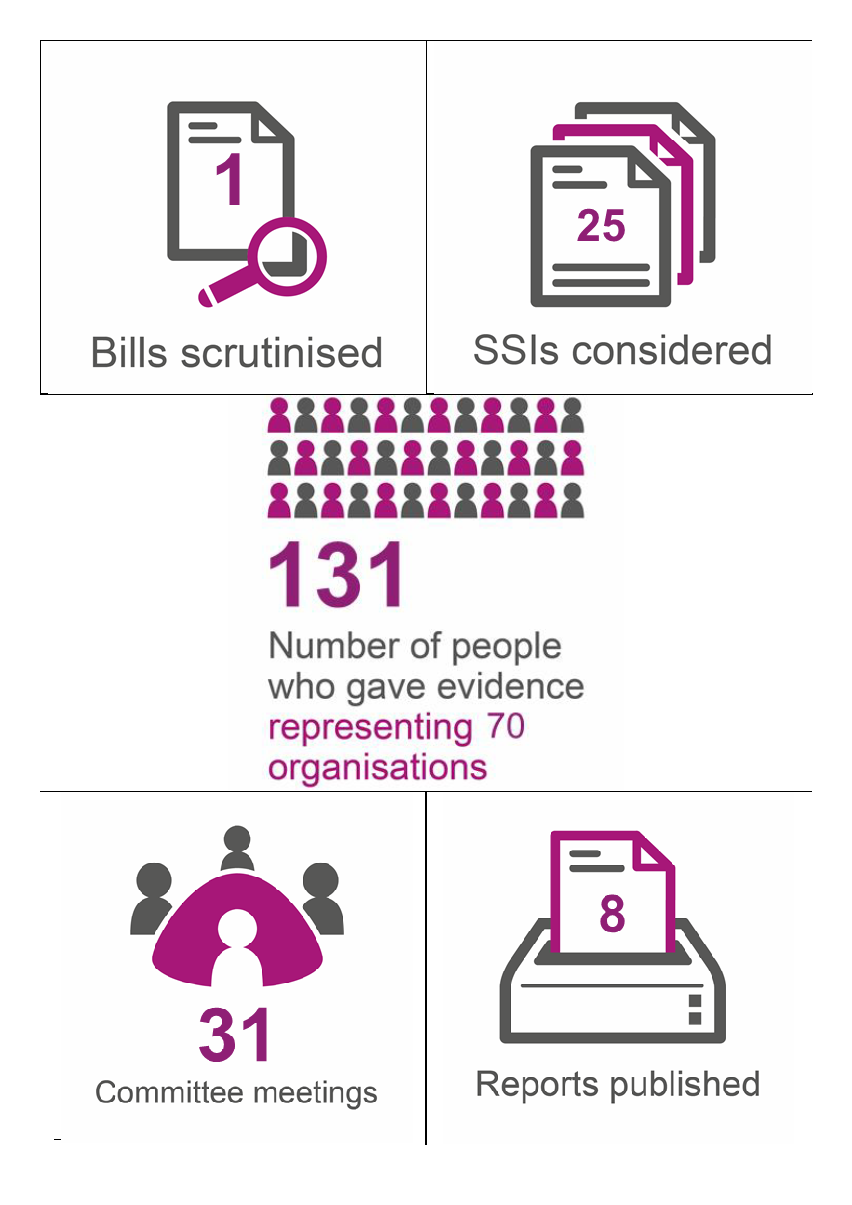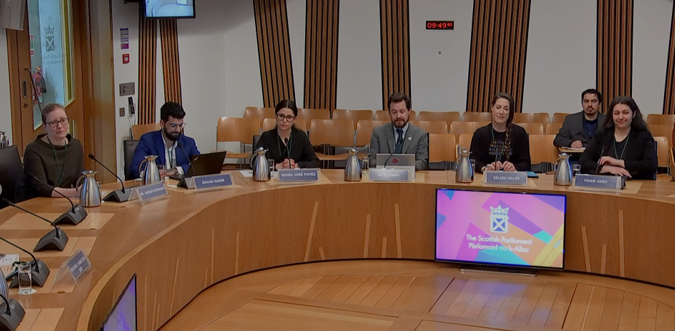Equalities, Human Rights and Civil Justice Committee
Annual Report of the Equalities, Human Rights and Civil Justice Committee for 2022-23
Introduction
This annual report covers the work of the Equalities, Human Rights and Civil Justice Committee during the Parliamentary year from 13 May 2022 to 12 May 2023.
Membership Changes
There were three changes in Committee membership during the reporting year:
Joe FitzPatrick, who served as Convener from 23 June 2021, left the Committee on 11 April 2023 and was replaced by Kaukab Stewart, as Convener of the Committee, on 25 April 2023.
Alexander Stewart left the Committee on 25 May 2022 and was replaced by Rachael Hamilton on said date.
Pam Duncan-Glancy left the Committee on 25 April 2023 and was replaced by Paul O'Kane on said date.
Meetings
The Committee met a total of 31 times during the reporting period:
2 meetings were held entirely in private
3 meetings were held entirely in public
26 meetings included private items
The reasons for taking business in private included to consider the Committee's work programme, to consider draft reports or to consider evidence heard during meetings.
In addition, the Committee held a number of informal, private engagement sessions. These are reflected throughout this report and summarised in the Engagement and Innovation section.
Inquiries and Reports
Asylum Seekers in Scotland
The Committee agreed, as part of its work programme consideration on 6 December 2022, to build on work of previous inquiries into race inequality and to complement scrutiny being undertaken by other Committees in monitoring the Scottish Government's progress in key policy areas.
A detailed approach was agreed at a further work programme consideration on 17 January 2023. The Committee agreed to have an initial session with stakeholders at its meeting on 7 February 2023 to assist Members with discussions and agreement on the focus of the inquiry going forward. This was under the initial working title of "Race Inequality in Scotland".
Following the session with stakeholders on 7 February the Committee agreed a timetable for evidence sessions and engagement, starting on 25 April 2023 and completing at the end of June 2023. Further information and related correspondence can be found on our Asylum Seekers in Scotland inquiry web page.
The Committee aims to publish its report in early September 2023, shortly after returning from parliamentary summer recess.
Asylum Seekers in Scotland evidence session The Scottish Parliament
Bills
Gender Recognition Reform (Scotland) Bill
The Committee was designated lead committee for scrutiny of the Gender Recognition Reform (Scotland) Bill, which was introduced on 2 March 2022 complemented by a Ministerial Statement on 3 March 2022 from Shona Robison, the then Cabinet Secretary for Social Justice, Housing and Local Government.
Formal evidence sessions at Stage 1 began on 17 May 2022 and concluded with an evidence session with the Scottish Government on 28 June 2022.
In advance of the formal evidence sessions, the Committee held private, informal engagement sessions with trans people with lived experience of the gender recognition process. Notes of those meetings were published.
Prior to concluding formal evidence sessions, the Committee held two further private, informal engagement sessions on:
The Committee published its Stage 1 Report on 6 October 2022 and the Scottish Government's response was published on 26 October 2022.
The Stage 1 debate was held on 27 October 2022. Following that debate, the general principles of the Bill were agreed to with the following result:
88 for
33 against
4 abstained
4 did not vote
At Stage 2, when MSPs propose changes (amendments) to detail in the Bill, the Committee considered, over the course of two meetings, a total of 155 amendments lodged by 23 MSPs:
Further amendments to the Bill were debated by the Parliament at Stage 3 over the course of two days:
The final debate on the Bill was held on 22 December 2022. Following the debate the Bill was passed by the Parliament with the following result:
86 for
39 against
0 abstained
4 did not vote
Section 35 Order
On 17 January 2023 the Secretary of State for Scotland gave a statement in the House of Commons confirming he had made an Order under Section 35 of the Scotland Act 1998. This Order prevents the Presiding Officer from submitting the Bill for Royal Assent. Therefore the Bill cannot become law in its current form.
Further information regarding the Bill process and proceedings can be found on our Gender Recognition Reform (Scotland) Bill web page.
Regulation of Legal Services (Scotland) Bill
The Committee has been designated lead committee for scrutiny of the Regulation of Legal Services (Scotland) Bill, which was introduced on 20 April 2023.
The Committee expects to conduct its scrutiny of the Bill during the next reporting period. Further information and background to the Bill can be found on the dedicated Bill web page.
United Nations Convention on the Rights of the Child (Incorporation) (Scotland) Bill
The Committee has continued to monitor any progress on UNCRC following the Supreme Court ruling on 6 October 2021 and most recently wrote to the Scottish Government on 9 May 2023 in response to an update received from the former Minister for Children and Young People on 16 March 2023.
Pre-Budget Scrutiny 2023-24
Ahead of the Scottish Government publishing its budget for 2023-24 in December 2022, the Committee agreed that its pre-budget scrutiny should focus on equality considerations being embedded in the budget process and used to inform tax and spending decisions.
As part of this pre-budget scrutiny the Committee launched a short call for views on the Impact of Human Rights Budgeting, which ran from 4 July to 9 September 2022 and received 13 responses.
The Committee took evidence from stakeholders at its meeting on 25 October 2022 and from the then Minister for Equalities and Older People on 1 November 2022.
Following those sessions, the Committee wrote to the Minister on 10 November 2022 and received a response on 23 December 2022.
The Committee took further evidence from the Minister on 31 January 2023, with a follow-up letter received on 17 March 2023.
Minimum Core Obligations
To support its work on human rights budgeting, the Committee agreed to undertake work on Minimum Core Obligations.
These are legal obligations and responsibilities of a country relating to economic, social and cultural rights and must be complied with at all times and in all circumstances. In Scotland these include:
ensuring people are not deprived of essential food
ensuring access to water
ensuring access to basic shelter or temporary accommodation
providing free primary education for everyone
having a national public health strategy
so that a person can live with human dignity.
The work on minimum core obligations will provide context ahead of the Scottish Government introducing a new Human Rights Bill in this parliamentary session.
The Committee held an evidence session on 21 February 2023 and expects to hold further sessions over the next reporting period.
One-off evidence session on access to justice
As part of its civil justice remit and building on roundtable sessions held in previous reporting periods, the Committee held a further roundtable session on 14 March 2023. This focused on access to justice and how services are currently supporting people who are seeking advice, the challenges the services are facing, access to funding and views on the proposed legal aid reform.
Petitions
Petition PE1817: End Conversion Therapy
Petition PE1817: End Conversion Therapy was lodged in July 2020.
As highlighted in the Committee's Annual Report 2021-22, the Scottish Government committed to bring forward legislation as far as is practical within the powers available to it by the end of 2023, and the establishment of an Expert Advisory Group on Conversion Practice to inform the development of such legislation.
The Expert Advisory Group published its report and recommendations on 4 October 2022.
Following evidence from representatives of the independent Expert Advisory Group on 13 December 2022, the Committee agreed to formally close the petition on the basis that the Scottish Government has confirmed its commitment to bring forward legislation.
Petition PE1787: The use of Makaton sign language in the legal system
PE1787 The Use of Makaton Sign Language was lodged on 15 January 2020. It calls on the Scottish Parliament “to urge the Scottish Government to ensure that all parts of the legal system use Makaton Sign Language”.
The Committee took evidence from the petitioner on 13 December 2022. Following this session, the Committee agreed to keep the petition open and to write to the Scottish Government asking for its initial thoughts on the evidence presented.
The Scottish Government responded on 13 February 2023 and noted the petitioner’s concerns about the implications for access to justice for a person who communicates using Makaton.
The Committee considered the Scottish Government's response at its meeting on 28 February 2023. It agreed to keep the petition open and to write to the petitioner. It also agreed to write to the Public Guardian in Scotland, the Mental Welfare Commission for Scotland, the Scottish Courts and Tribunals Service, Police Scotland and COSLA. Further work on this petition will be undertaken during the next reporting period.
Subordinate Legislation
During the course of the reporting year, we considered—
Ten SSIs subject to the affirmative procedure; and
Fifteen SSIs subject to the negative procedure.
Engagement and Innovation
Further to the informal engagement sessions on the Gender Recognition Reform (Scotland) Bill, referenced previously in the report, the Committee undertook a visit to the Health and Education Chamber of the First-tier Tribunal for Scotland for Children with Additional Support Needs on 7 March 2023 as part of our access to justice work to understand how children's voices can be heard.
The Committee learned how, in order to meet the needs of children and young people with additional support needs, three new hearing suites had been developed. These were designed following detailed consultation with children and young people who had additional support needs, some of whom were care experienced. Some of these children and young people also had experience of a number of different hearing environments, including children's hearings and hearings in the Sheriff Court.
The Committee sought to undertake informal engagement with members of the gypsy/traveller community. It had been hoped that Members would visit a range of sites across Scotland on 18 April 2023. Despite significant efforts alongside stakeholders to facilitate the visits, due to a number of circumstances, the visits regrettably had to be postponed.
The Committee is sorry this engagement was not able to proceed. We hope to revisit this engagement in the next reporting year.
The Committee wrote to the Scottish Government on 19 April 2023 regarding the funding of the Gypsy/Traveller Community Health Worker Service. The response from the Scottish Government will be published on our correspondence pages.
Further to its evidence sessions on Asylum Seekers in Scotland, the Committee intends to undertake engagement with stakeholders and individuals with lived and ongoing experience of the asylum system. The Committee is very grateful to the agencies who have supported us in this process. The outcomes of this engagement and inquiry will feature in our next Annual Report.
The Committee year in numbers  The Scottish Parliament
The Scottish Parliament
